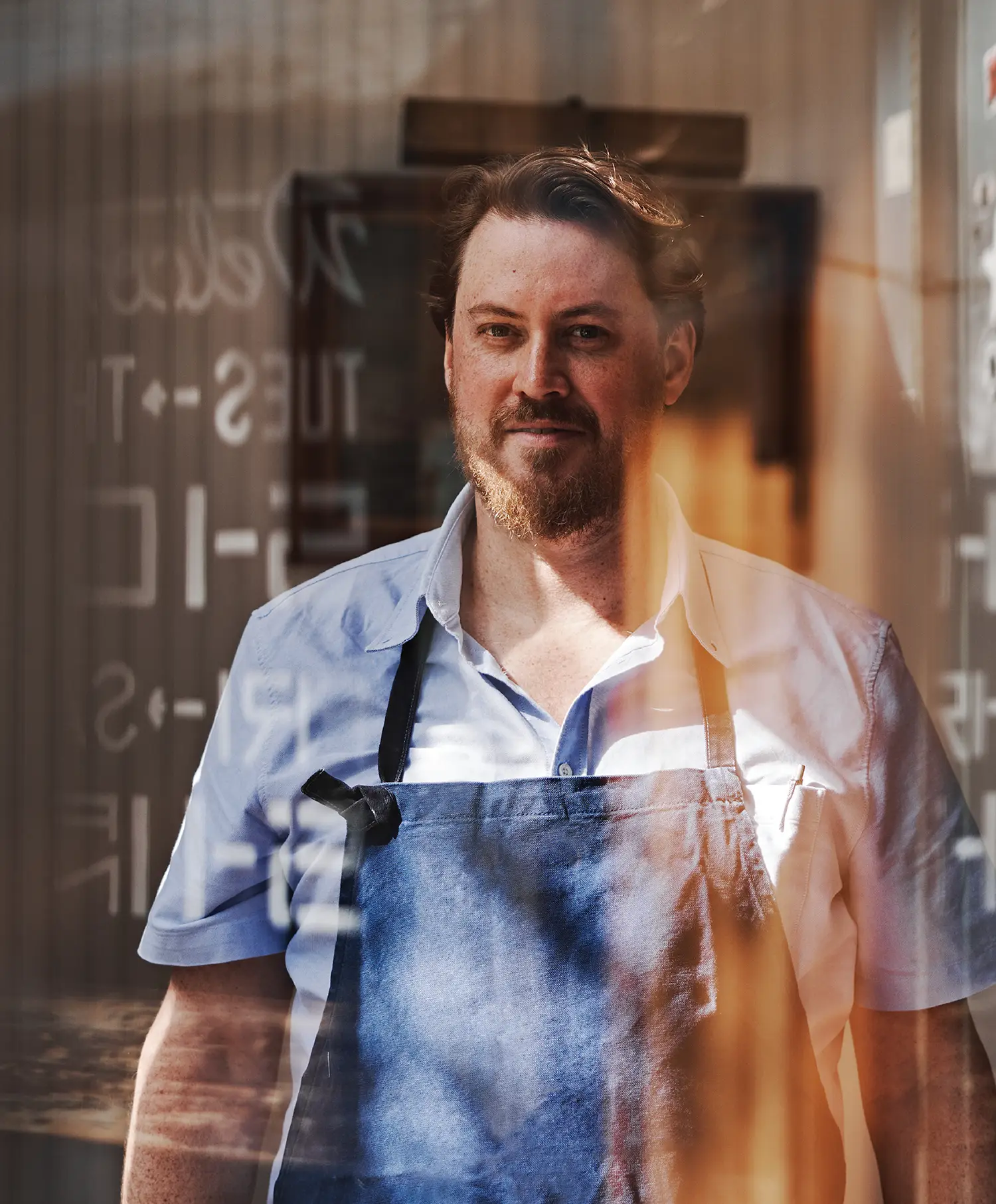

 Reese Moore
Reese Moorehe College’s Department of Hospitality and Tourism Management in the School of Business just wrapped up a yearlong celebration of its 25th year as a program at the College and its 20th year as a major. Travel + Leisure readers have voted Charleston the No. 1 tourist city in the country for 12 years running. Coincidence? Probably not, since it’s a self-perpetuating cycle: As one of the finest of its kind in the country, the program keeps producing alumni like those on the following pages who in turn improve the tourism experience, then in many cases return to the classroom to share their insights and/or offer internships to current students.
 Reese Moore
Reese MooreThe faculty and staff provide a high-quality education, offering a blend of theoretical, practical and experiential learning opportunities in one of the world’s premier destinations.
“We are fortunate to be able to teach our students in the ‘living laboratory’ of Charleston,” says the ever-popular professor Steve Litvin, who has been teaching at the College for 23 years and supervises student research in the department. “Whether a student has an interest in lodging, event planning, food and beverage, sports management or any other related segment, they find willing industry partners to offer part-time jobs and internships while in school – and wonderful employment opportunities when they graduate.”
About 100 companies in Charleston hosted interns in 2024, according to senior instructor and internship coordinator Jeremy Clement, with 98% of interns receiving positive evaluations from their host organizations.
“As a hallmark of the experiential and deeply impactful nature of our program in our local hospitality community, students from the department’s Events Management class created a series of events for alumni, industry partners and students alike to celebrate our achievements together,” he says. “Between these events, hundreds of College alumni working in the local hospitality industry joined in the celebration. Our hospitality program uniquely creates the next generation of leaders for our industry, and these events were a testimony to that success.”
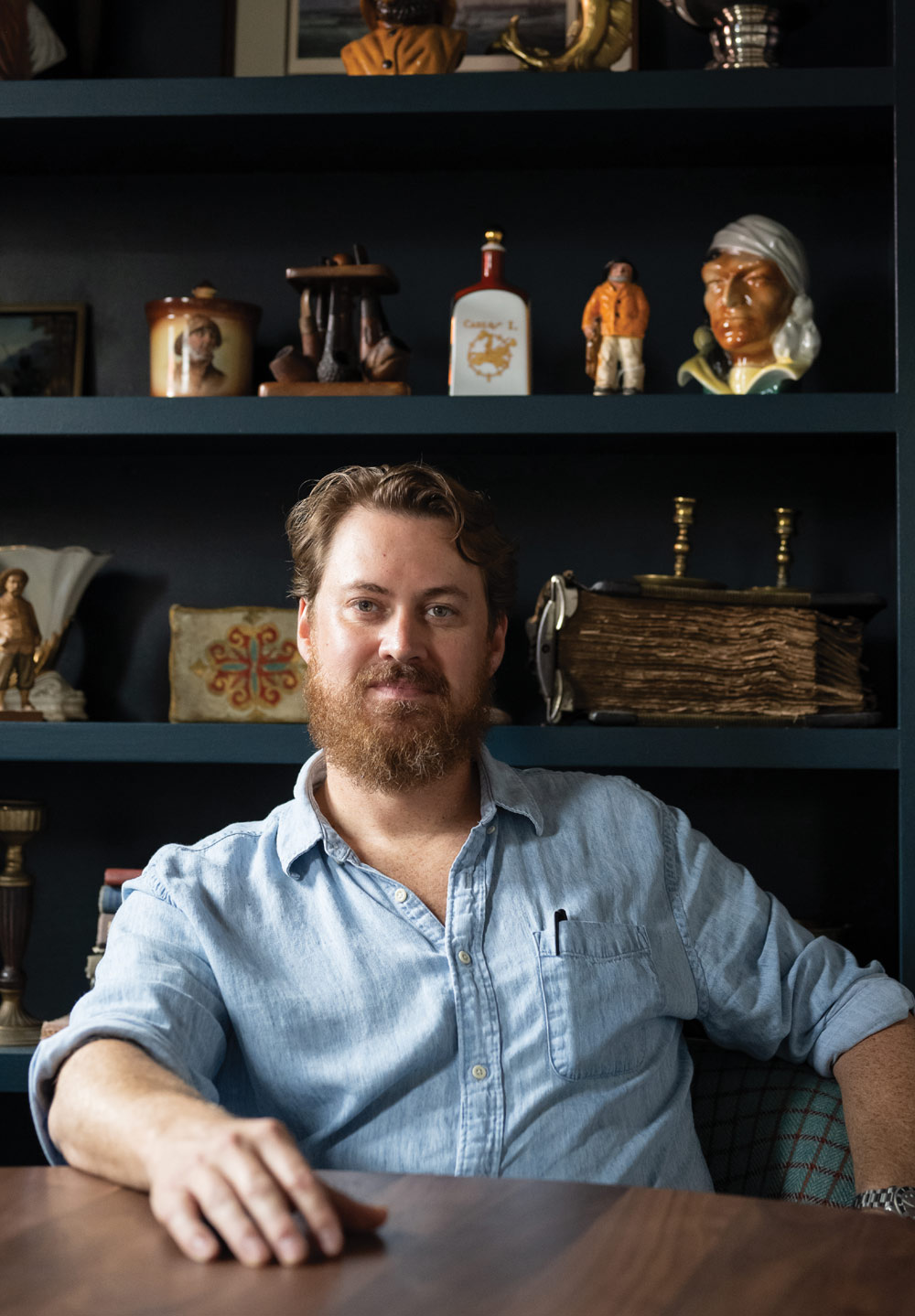
JAMES
LONDON ’07
Owner and chef of Chubby Fish
Charleston
s a young boy visiting his aunt and uncle’s home on Edisto Island, S.C., James London ’07 would sit on their dock from sunrise to sunset with a fishing pole in hand, pulling in whiting, redfish, sheepshead and speckled sea trout. He’d proudly deliver buckets of fresh catch to his mother, Donna Sparkman London ’77, who would clean and cook the seafood for family dinner.
“There was this sense of being able to provide for people,” London recalls. “I could feed my family by doing something I love.”
Today, as the owner-chef of the acclaimed Chubby Fish in Charleston, he’s doing much the same thing but on a much grander scale, feeding about 165 people a night, five times a week. The 1,000-square-foot, 38-seat restaurant has won a noted trifecta of awards since it opened in 2018: a Best New Restaurant nod from Bon Appetit (2019), a Global Tastemakers award from Food & Wine as the seventh-best restaurant in America (2024) and a James Beard Award finalist nomination for Best Chef: Southeast (2024).
“We’re not in this business to make money,” says London, sitting inside Chubby Fish on a weekday afternoon as a line starts to form outside. “I’m so passionate about putting the best product on the plate, and you really feel that passion ripple through the food and every interaction you have with every single employee here.”
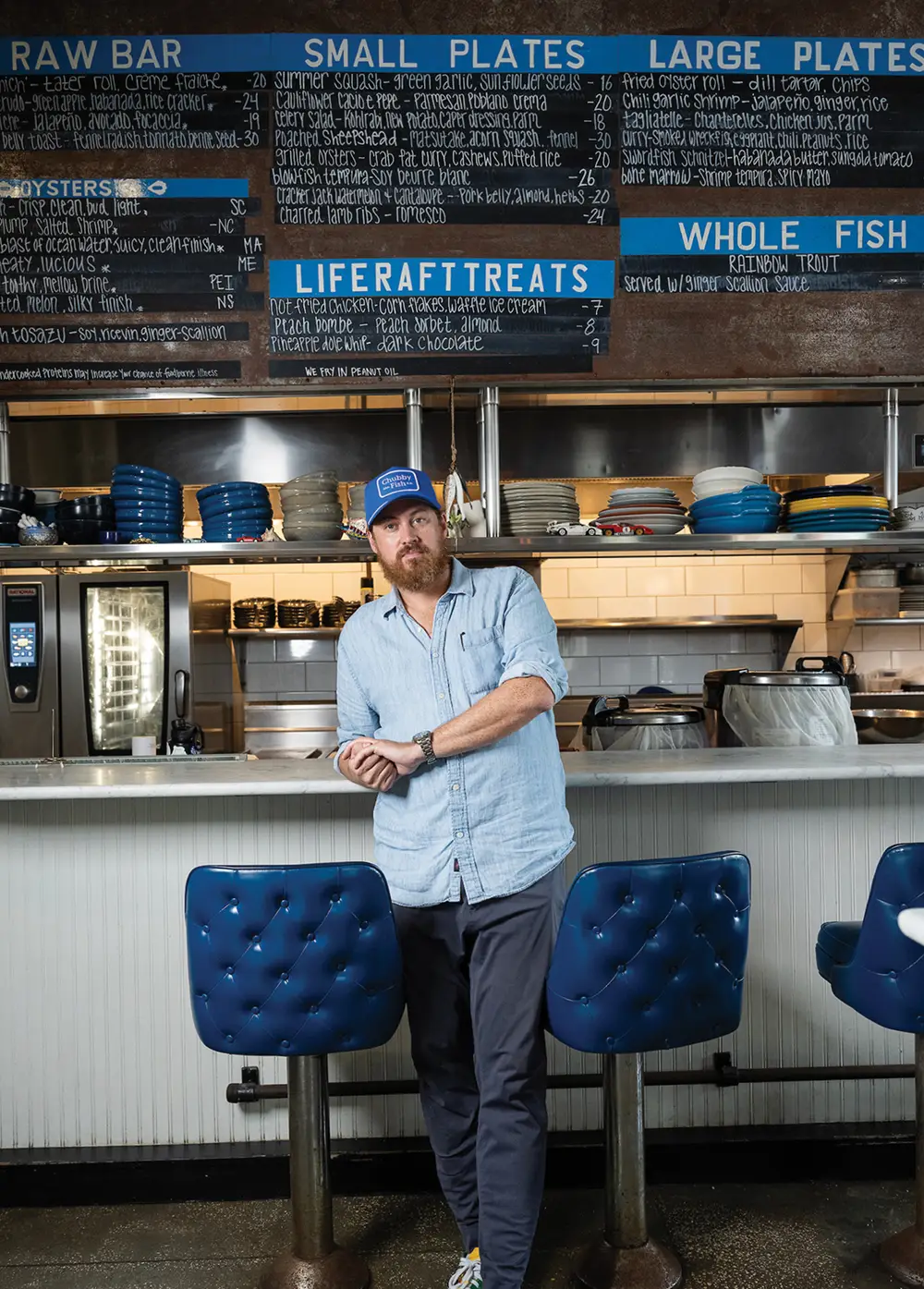
“Chubby Fish would not have happened without Dr. Frash,” says London, who had been working in restaurants since age 14 before Frash expanded London’s ideas of the business in his Restaurant Enterprise class, among others. “I was into restaurants for the food side of things, so hearing Dr. Frash talk about this restaurant and that restaurant he opened was very impactful. He really opened my eyes that I could do that, too, one day.”
Frash remembers London as the quiet kid in the back of the room who always went above and beyond, but he scoffs at the notion that he had anything to do with London’s success, calling him “clearly a prodigy.”
“He told me he walks his dog and gets these sort of visions for what he might do,” says Frash. “They sort of come to him almost like a song would come to Bob Dylan.”
The music analogy is apt, as London was also a drummer in a couple of funk bands while he was in college. A pivotal moment came when the head chef at Carolina Yacht Club noticed London’s natural talent and passion in the kitchen – but, because of his dueling interests, his fellow line cooks had to clean his station when he’d rush out to gigs, while his bandmates had to set up his drum kit and cover his soundchecks.
“Tomorrow when you come in,” the chef told him after sitting him down one day, “you’re gonna tell me if you’re gonna be a drummer or a chef.”
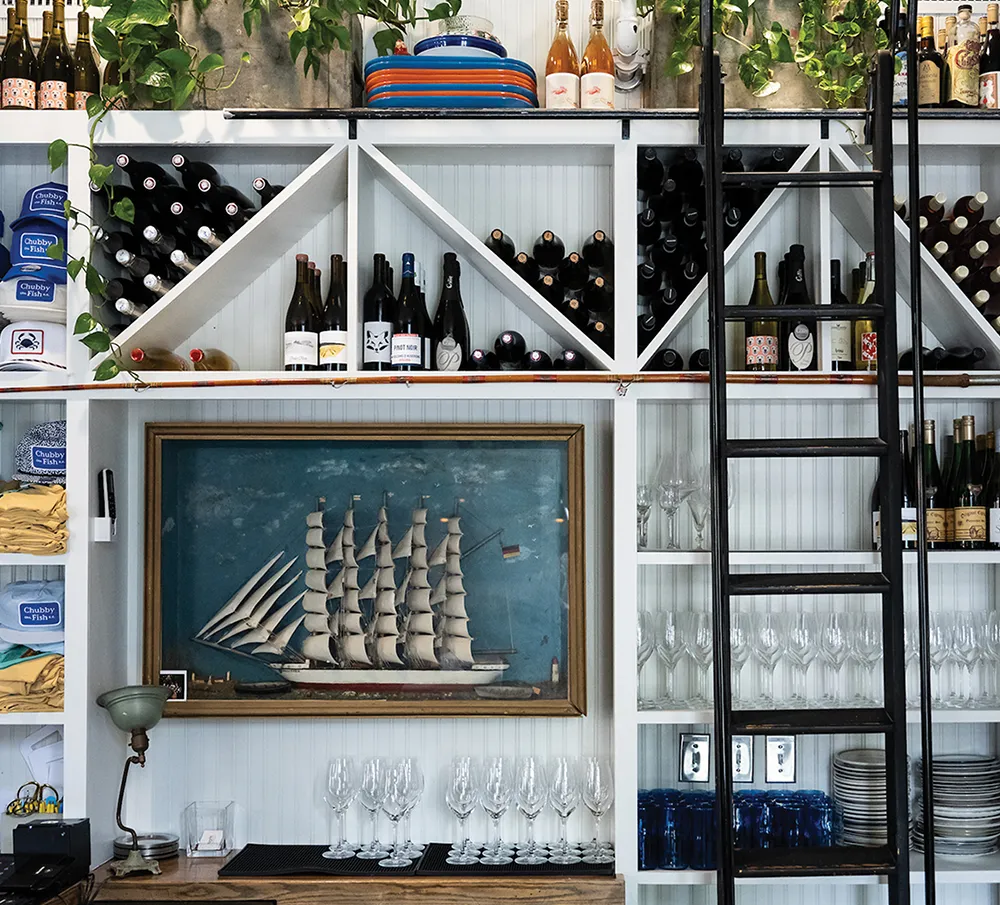
After graduating with degrees in business administration and hospitality and tourism management, London moved to New York City to attend the French Culinary Institute, studying under legends like Jacques Pépin and Jacques Torres while doing internships at revered restaurants like Eleven Madison Park. Seven years in demanding New York kitchens honed his technical skills – and the next four years in San Francisco transformed his cooking philosophy.
“In New York, it was all about technique and presentation,” says London. “San Francisco simplified my food. It became more about quality of ingredients and flavor.”
By 2017, he was finally ready to return to Charleston and open his own place, where he could draw on his culinary toolbox to celebrate the diversity of Lowcountry seafood.
“We’re between two major fisheries – the mid-Atlantic and the South Atlantic,” he explains. “Where those two fisheries overlap is right smack dab at Charleston, so we’re getting double the species of anyone else.”
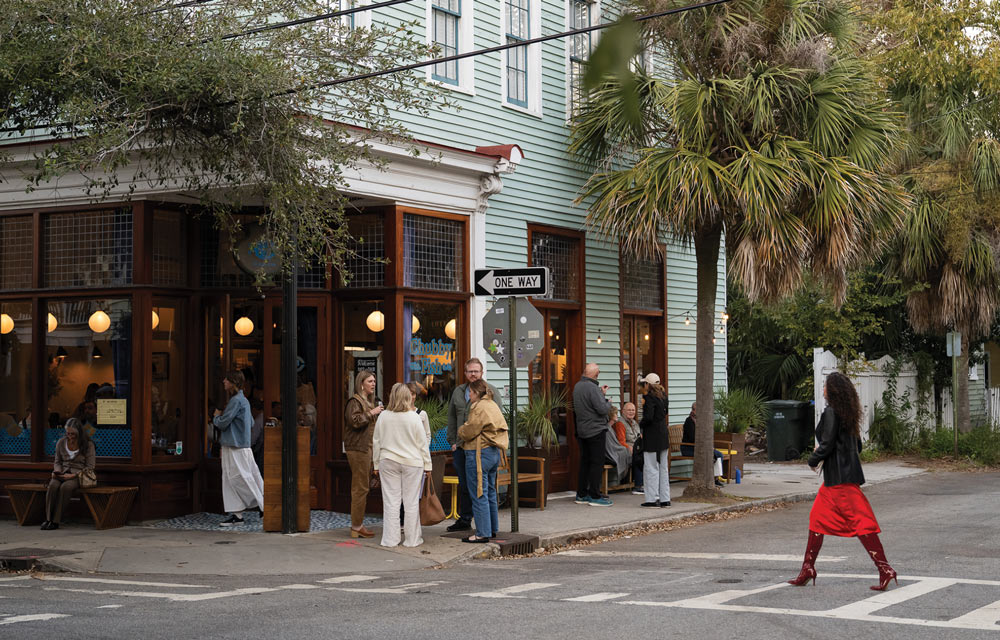
“Often chef-owners have culinary talent but are terrible businesspeople,” says Frash. “James is rare in that he excels at both.”
But more importantly to London, he has created a family-like culture among his staff of 18, leading to almost zero turnover in an industry known for constant churn. “He always puts his staff in front of profits,” says Frash. “He operates his business as a family.”
London has no interest in expanding, although he did just open a cocktail bar, Seahorse, next door to Chubby Fish, serving small bites to diners on the waitlist. But his main focus remains on mentoring the next generation of culinary talent while maintaining the high standards that have made his restaurant a national destination.
“It’s just so much fun being able to make people happy,” says London. “There are not many careers where we get to put so much focus every single day into trying to ensure that somebody is getting one of the better meals of their lifetime. It’s a special place to be.”
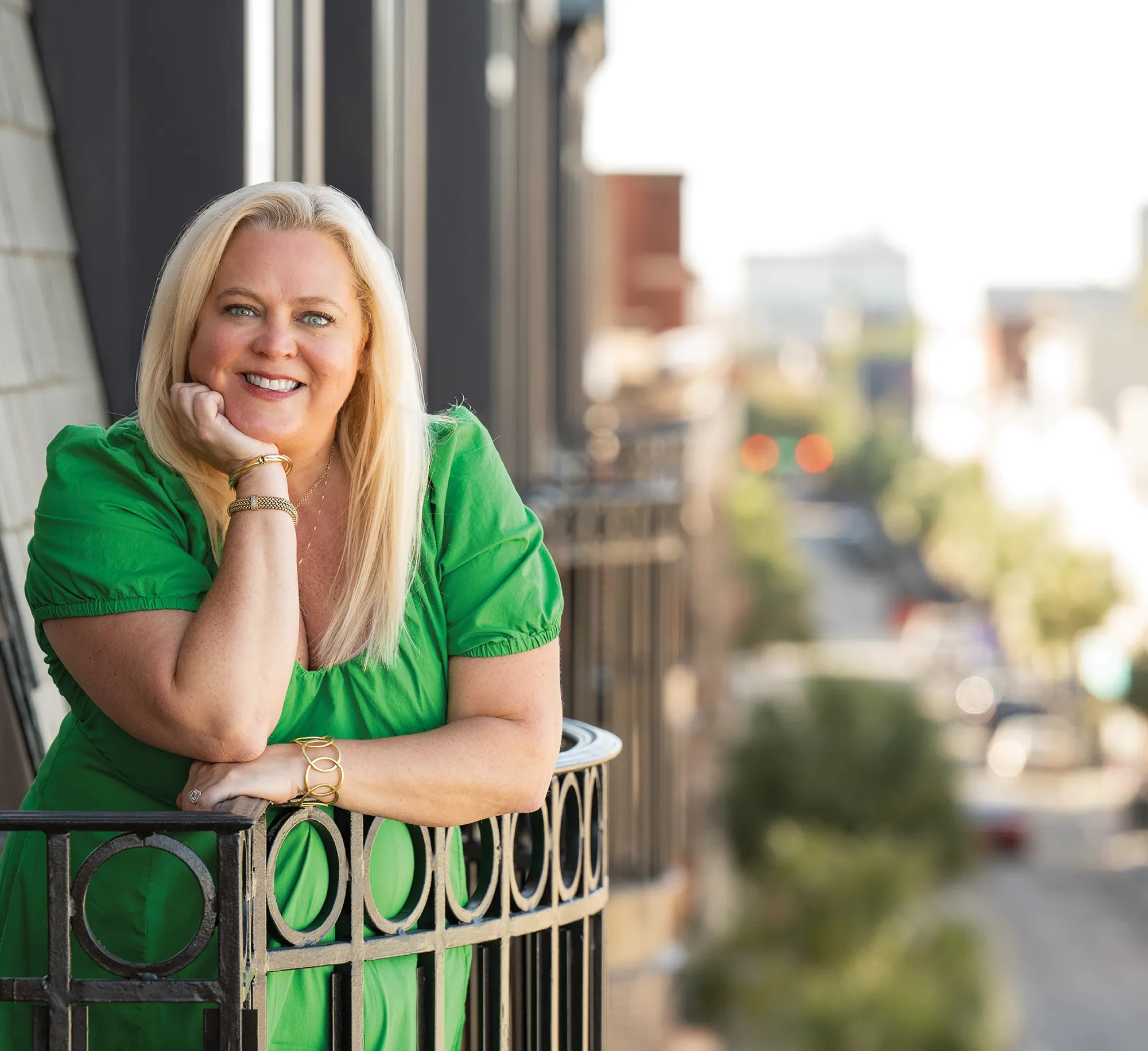
Catherine
Dority ’99
Vice President of Marketing
Explore Charleston
atherine “Cat” Dority ’99 chose the College because of its location – appropriate, given her career. Most of her classmates in Florence, S.C., were attending two other universities in the state, but Dority wanted something different.
“Charleston just seemed so cosmopolitan and so exciting,” she says.
The summer of her sophomore year at the College, she passed a tour guide test and began working as a driver for one of the local carriage companies. This would be the catalyst for a career in hospitality and tourism.
When her advisor, Lynn Cherry, associate chair of the Department of Communication, told her to soak up all that she could, Dority applied for an internship with academic credit at the Charleston Area Convention and Visitors Bureau (now Explore Charleston). Two weeks into the internship, the assistant to the CEO resigned, and the junior communication major quickly came up with a plan.
“You don’t need to replace her,” she said to the CEO, Helen Hill. “I can do the job.”
Twenty-six years later with job title and duty evolutions (but the same CEO), Dority is still there – as the vice president of marketing.
Sharing why Charleston is a premier destination while helping to promote its hotels, restaurants, tour companies and attractions is Dority’s primary job. One could say it’s an easy task since readers of Condé Nast Traveler have named Charleston the No. 1 Small City in 2024 and Travel + Leisure has touted Charleston as the No. 1 City in the U.S. for the past 12 consecutive years – and the only U.S. destination voted among its 25 Best Cities in the World.
Telling the story of one of America’s oldest cities also affords her the opportunity to proudly showcase the 13th-oldest college in the country. She’s hosted familiarization trips for readers of Travel + Leisure that included lunch with President Andrew T. Hsu and his wife, Rongrong Chen, who also host an oyster roast at their home for state legislators that Dority plans every year during the Southeastern Wildlife Exposition.
“We like to show how we work hand in hand with the College,” she says.
That includes working with the School of Business Office of Tourism Analysis, led by Daniel Guttentag, to conduct competitiveness research and monitoring programs and share the resulting insights with decision-makers and stakeholders.
“We are fortunate to work with that office,” says Dority, praising the regular reports it provides on hotel performance, including metrics like average daily rate and occupancy. “They also help us identify who our visitors are, how much they spend and their travel patterns – when they come, when they don’t and possibly why. It’s a very close partnership.”
Dority also serves as the director of the Lowcountry Hospitality Association, advocating for affiliate members and overseeing the scholarships the association awards to CofC hospitality and tourism students. And she regularly speaks about industry standards to students in the College’s Beemok Hospitality Collection Service Leadership Scholars program.
“What better place to go to school, if this is the industry that you want to be in?” she says.
One of the projects Dority is proudest of is the Charleston Locals Guide, a video series that allows tourists to experience the city’s history and culture through some of its residents (including Hsu).
“This campaign makes Charleston feel more personal, and it helps people understand this is a living, breathing city,” says Dority. “It’s not fabricated – it’s our home.”
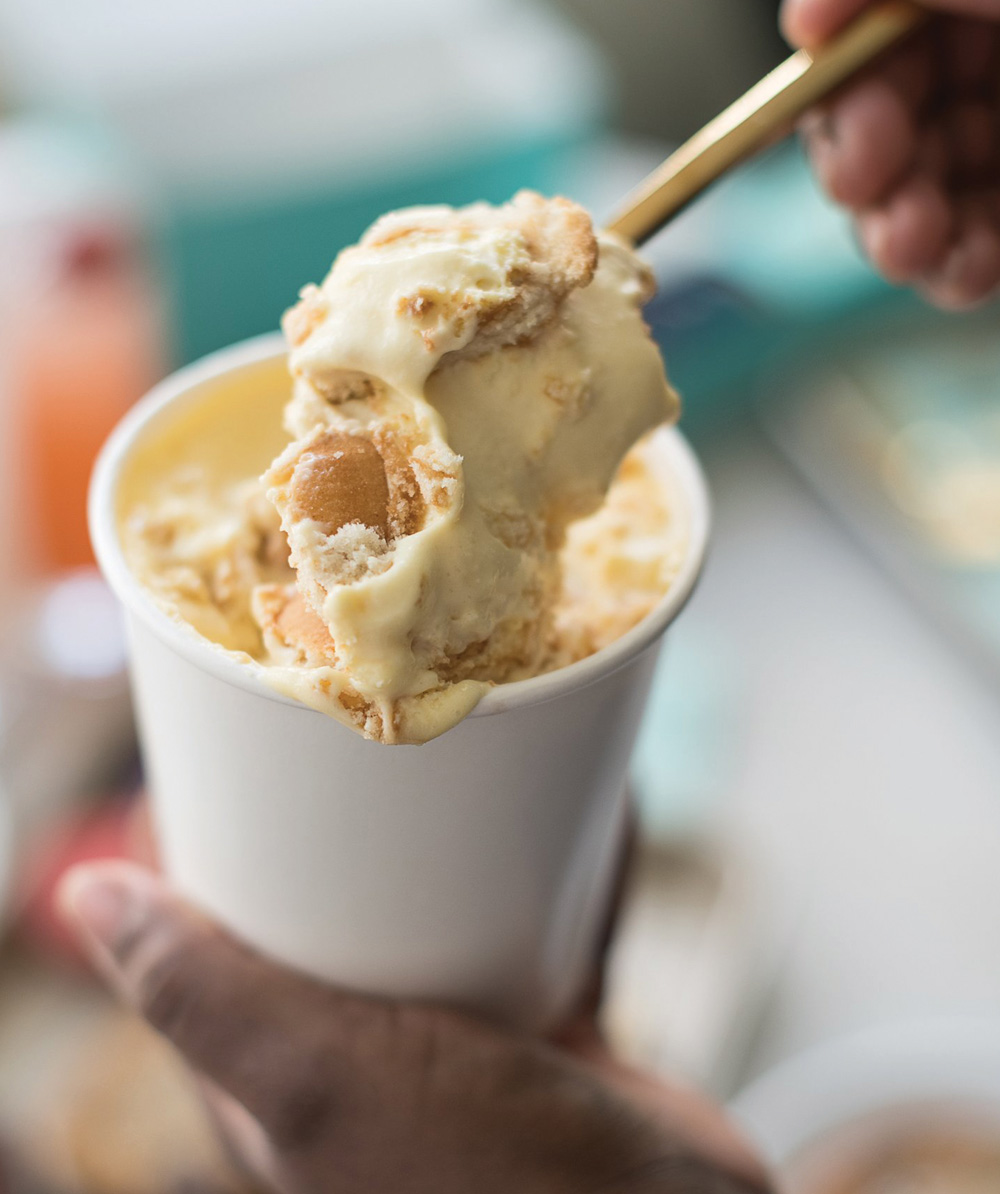
Danetra
Richardson ’12
Owner and Pastry Chef of Swank Desserts
Summerville, S.C.
t’s been 12 years, but Bob Frash can still taste the bacon-apple fritter Danetra Richardson ’12 cooked up in a deep fryer right there at her display table at the class fair.
“It was decadently good,” he recalls.
Richardson and her teammates were presenting Frash, the now-retired hospitality and tourism management professor in the School of Business, and the other judges with their food concept in their senior capstone project. Frash warned the class that he was going to be a lot tougher on restaurant ideas, so Richardson and the team did some research and decided on a late-night dessert lounge on King Street.
That concept, Swank Desserts, still has the same name, but it has morphed a little from its original plan and is now a popular grab-and-go bakery in Summerville, S.C., thanks to Richardson’s pastry, business and social media skills. One TikTok of her banana pudding (pictured above) drew more than 1 million views last summer. Macarons are another specialty, as are the brownies, like the dark chocolate-Nutella-salted-caramel fudge offering.
Influenced by her mom, the Virginia Beach, Va., native has always loved to cook and knew she wanted to go to culinary school by the time she was in high school. After doing so at Johnson & Wales University in Charlotte, N.C., she came to Charleston to do an externship at Magnolias and enrolled at the College at her mom’s behest to get a bachelor’s degree.
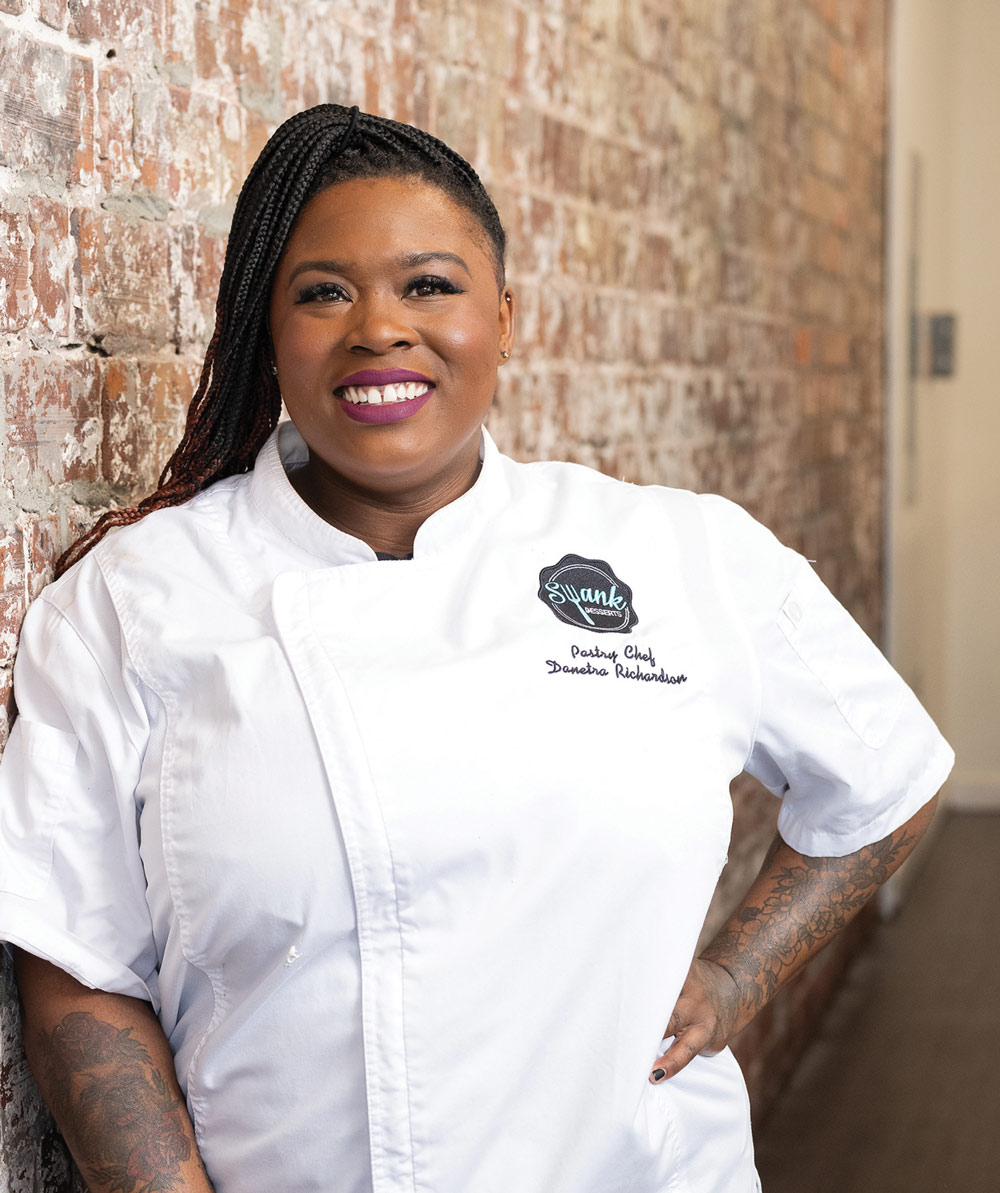
“The chef there allowed me to really be creative,” recalls Richardson. “The menu definitely reflected my style.”
In 2015, she started baking pies for holidays and selling them to friends and family through Facebook. By late 2019, she had opened her brick-and-mortar location in Summerville, strategically choosing the location to fill a niche, as she had learned in her capstone class, after studying the surrounding demographics.
“Downtown Charleston is super saturated,” she says. “I just knew out here I would have little to no competition. It was the perfect opportunity.”
Her parents passed on their strong work ethic, which is a good thing since, as owner and pastry chef, Richardson must wear many different hats, despite employing a staff of five (her father, Norman, was a huge part of her life and business before passing away in October).
“Social media is like a full-time job,” she says. “There’s just always something to do and stay on top of to make sure we keep moving forward.”
Just for the record, Richardson got an A in the class.
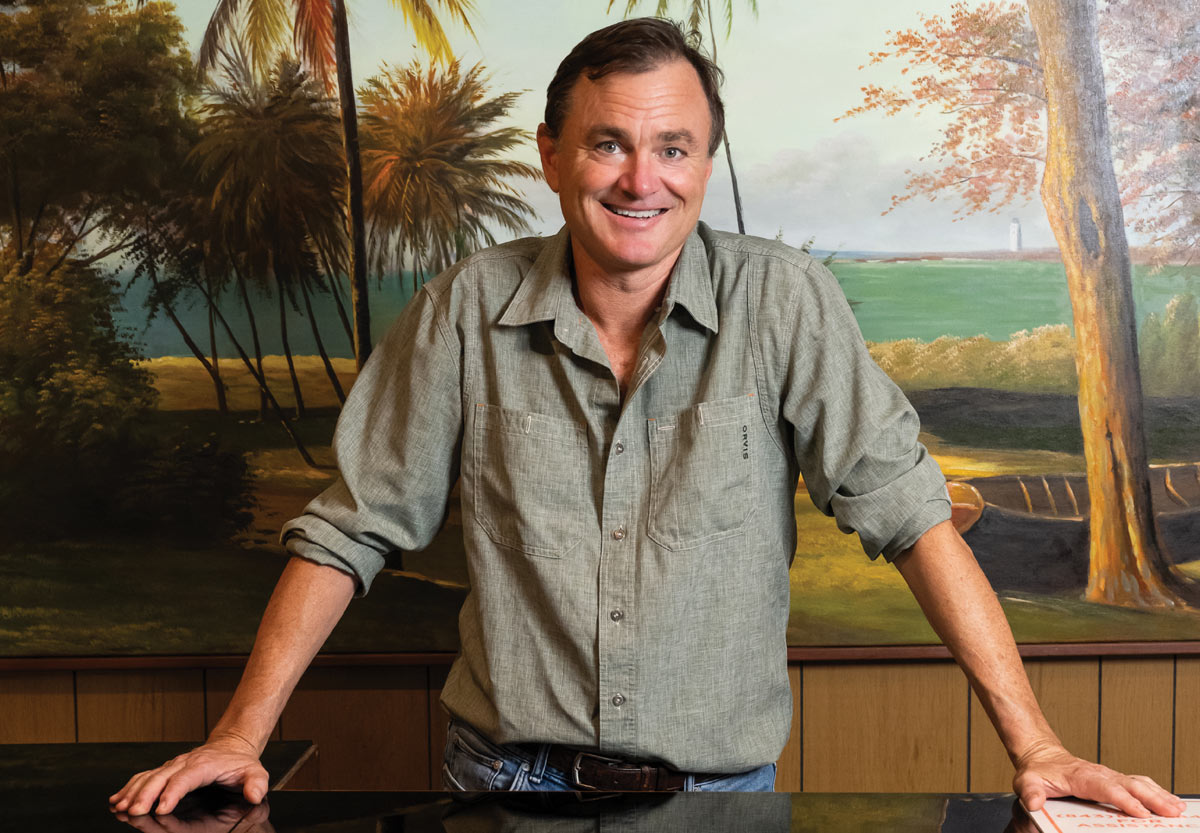
Ham
Morrison ’98
Owner of the Starlight Motor Inn
North Charleston, S.C.
eal estate developers catch a bad rap. Ham Morrison ’98 breaks that mold. A former race car driver and current owner of an eponymous motorsports and marketing company, Morrison operates differently.
It is only fitting that his path began not as a business major at the College but in the humanities.
Speaking of his major, Morrison remembers: “Sociology covers so much – human nature, societal trends, understanding what makes people tick, and how and why they think the way they do. And what better place to soak all that in than Charleston?”
Years after crossing the Cistern and many thousands of laps strapped into his race car, Morrison and fellow College alum Shelby Nelson ’94 began renovating historic properties in Charleston’s Eastside. The experience provided an education all its own.
“We learned what pleased people and what upset people,” says Morrison. “Most importantly, we learned respect for our community.”
Morrison took the lessons to heart. When the Redux Contemporary Arts Center was looking for a new home in 2016, Morrison offered favorable terms to the nonprofit for a large hangar on Upper King Street that was once a skating rink.
“People come here because of the quality of life and because Charleston is cool, and that’s because of the arts,” Morrison said at the time.
In 2019, a property near Rivers and Reynolds avenues in North Charleston caught his attention: the Starlight Motor Inn. He was perhaps the only one who saw its potential; the property had sat condemned for 15 years and was only months away from demolition.
A bit of history bolstered his case to save it – the Starlight may very well be the first modular-built motel in the U.S., which helped get it listed on the National Register of Historic Places.
Morrison is proudest of the motel’s bar, the Burgundy Lounge, open to both guests and locals.
“One of the most rewarding things is seeing the locals and motel guests hang out. The stories that room could tell … .”
Looking back over his career, has a mantra emerged?
“Good projects inspire good projects. I like the kind of growth that adds to the local fabric – and doesn’t just feed off it or add to sprawl and traffic. Projects that are a destination and not just a jumping off point.”
Or, as he puts it another way: “I love this city.”
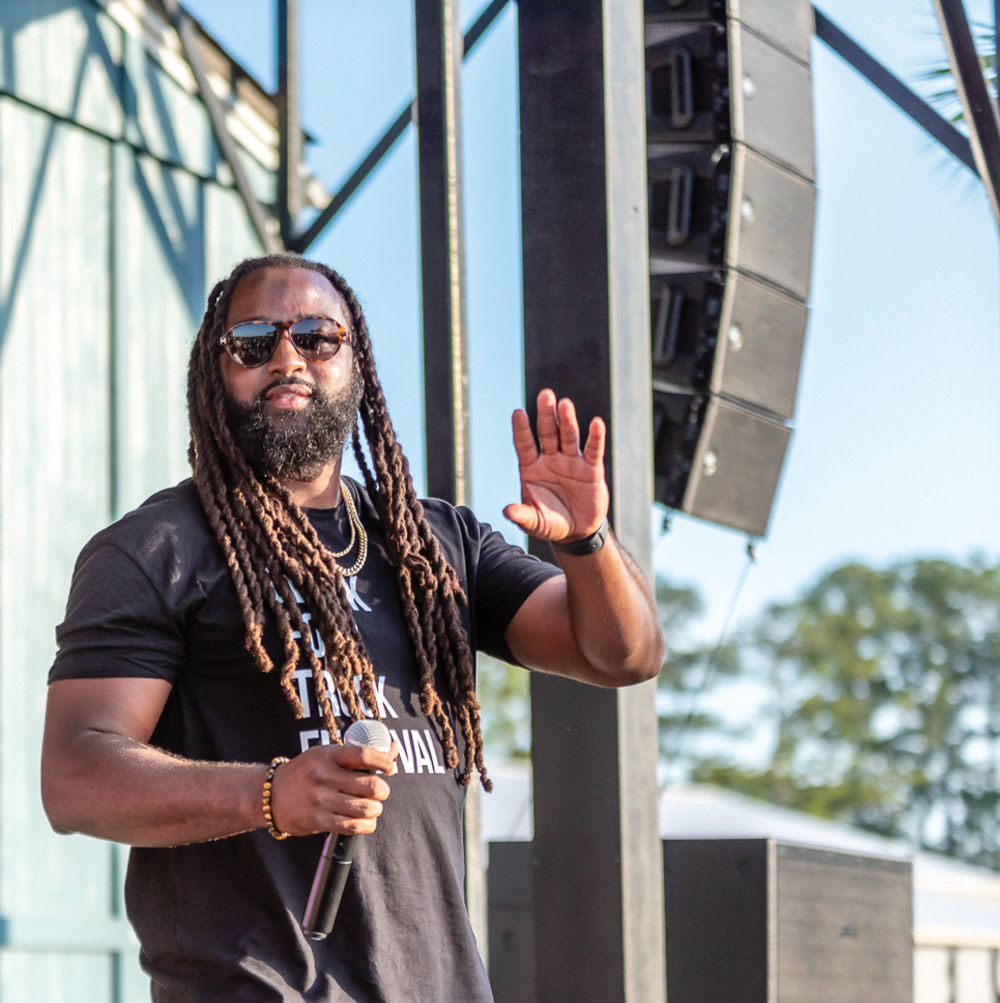
Marcus
Hammond ’08
Founder of the Black Food Truck Festival
Ladson, S.C.
n any given Sunday, the aroma of Southern delicacies like collard greens, black-eyed peas, and fried fish and chicken, as well as the sounds of R&B, filled Marcus Hammond’s childhood home in Memphis, Tenn. With his dad manning the grill and his mom in the kitchen, Hammond remembers laughing and playing with family members until the food was ready.
“Those times set the foundation for me to be in the hospitality field,” he says.
The rich Black culture of Charleston, not to mention the weather and the CofC men’s basketball program, which he captained his senior year, brought Hammond to the College.
“I always hosted events,” he says, referring to professional mixers, parties and basketball camps, among other gatherings. “But I wanted to do something that was multigenerational.”
That led to his creation of the Black Food Truck Festival, merging cultural experiences with food and music.
“There weren’t many cultural festivals in Charleston that catered to what Black people wanted,” he says. “Instead of complaining, I figured I would just create the vibe myself.”
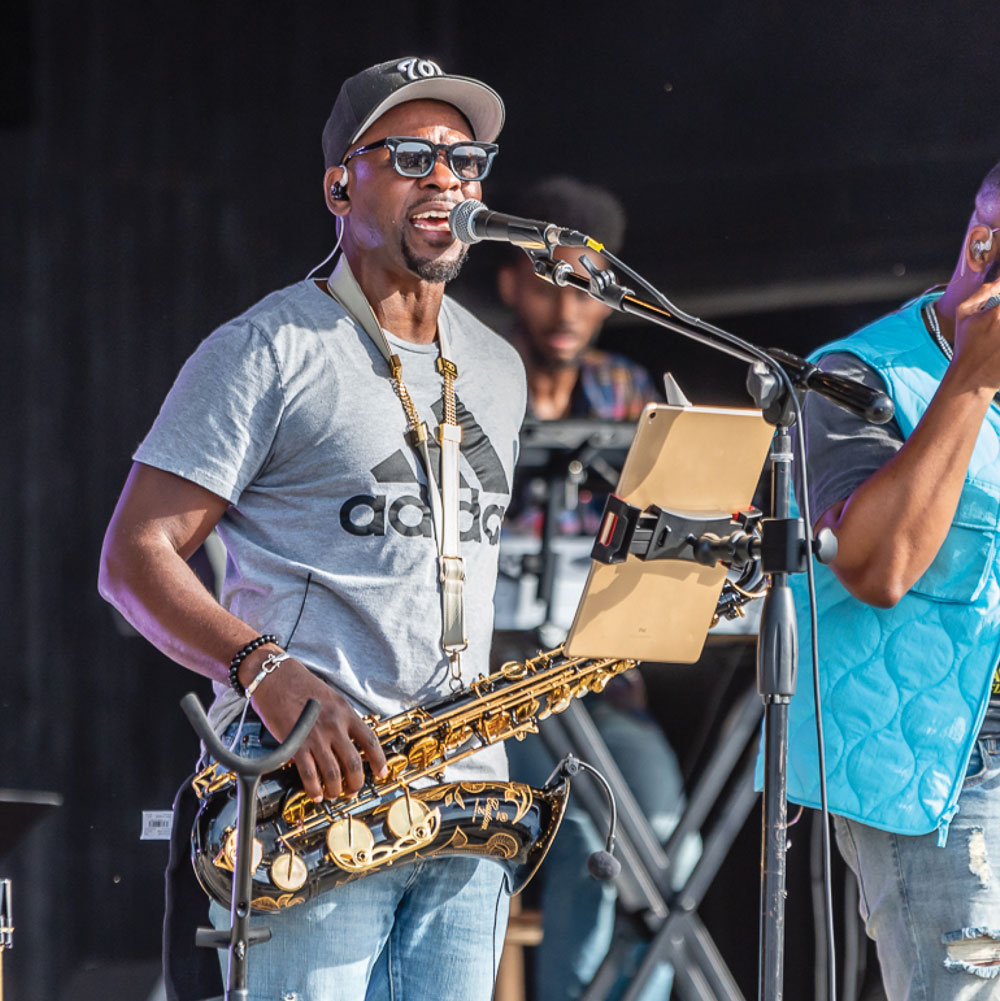
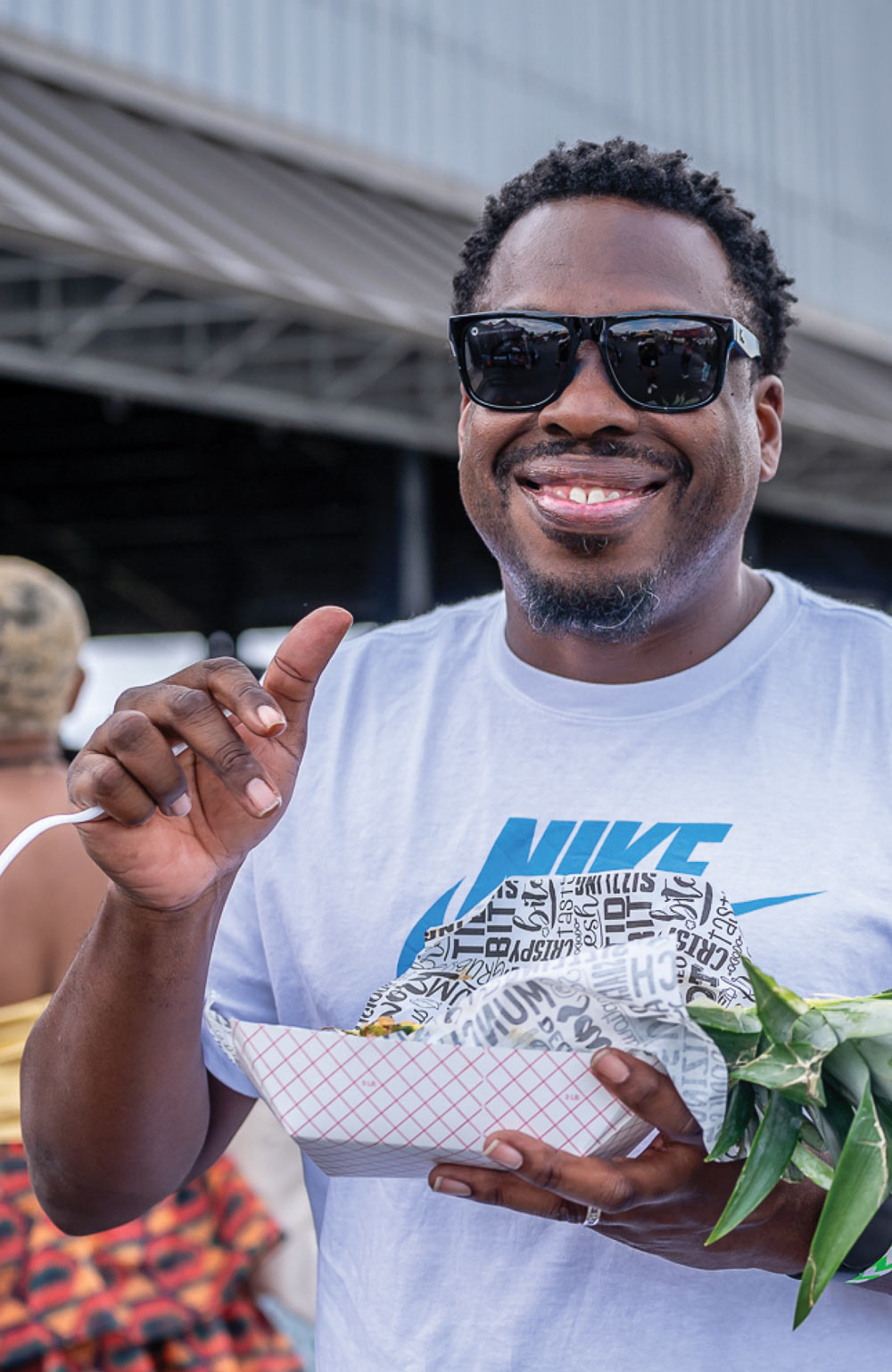
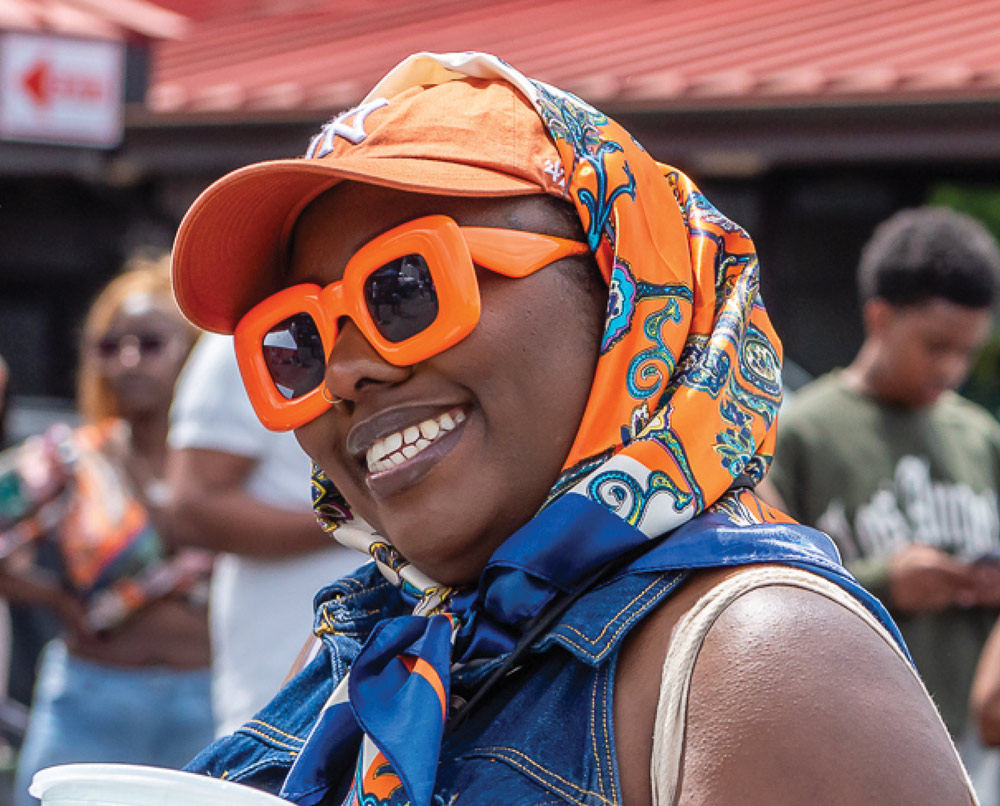
“There’s a rich Black culture in Charleston that hasn’t been celebrated around the world as loudly as we would like,” Hammond says, noting that the event draws upwards of 18,000 people a year – 70% from outside the state.
People like Clarise Nixon from Laurel, Md., who attended the 2024 festival and plans to return.
“I enjoyed this celebration of Black culture,” she says. “We ate, laughed, sang and danced to the excellent live music. It was more than just a food truck festival; it was an experience.”
Hammond sees the Black Food Truck Festival as a way to promote cultural understanding and appreciation of African food, Caribbean food, soul food, seafood and Gullah Geechee cuisine. Live music runs the gamut from go-go to soul to pop.
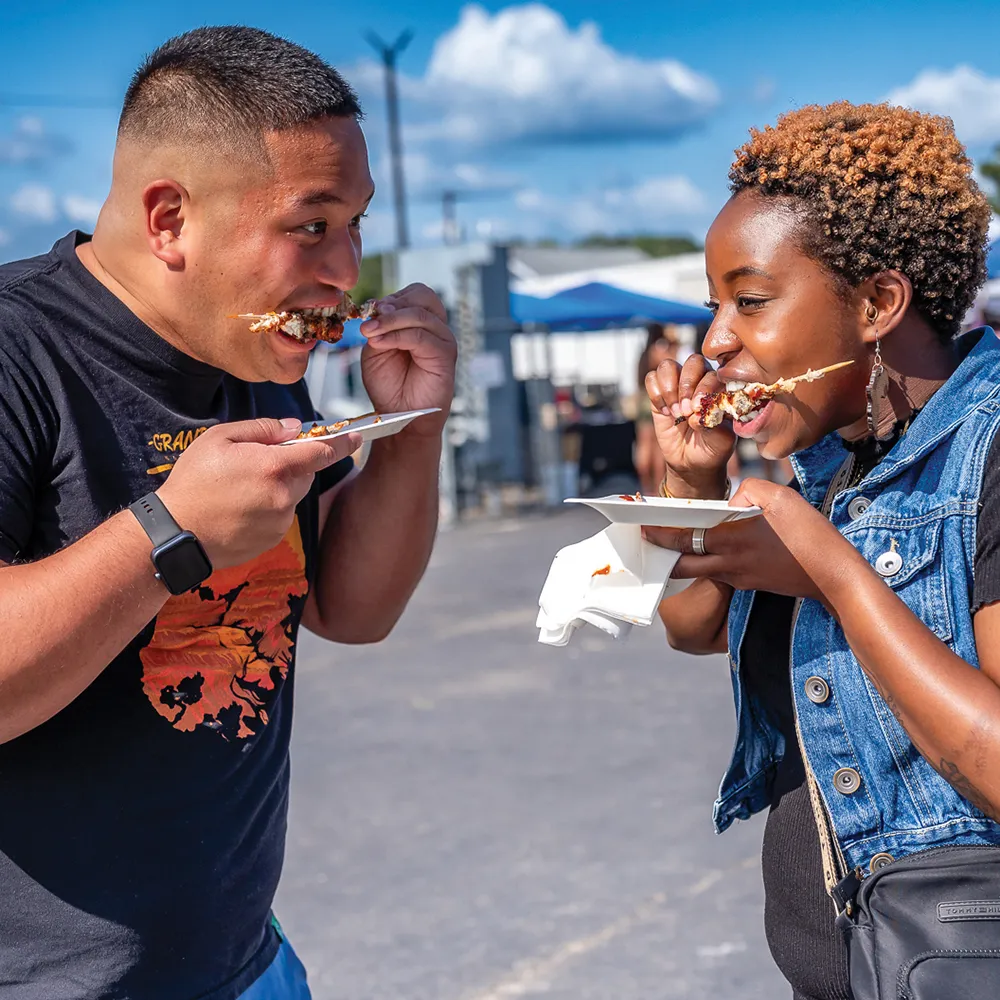
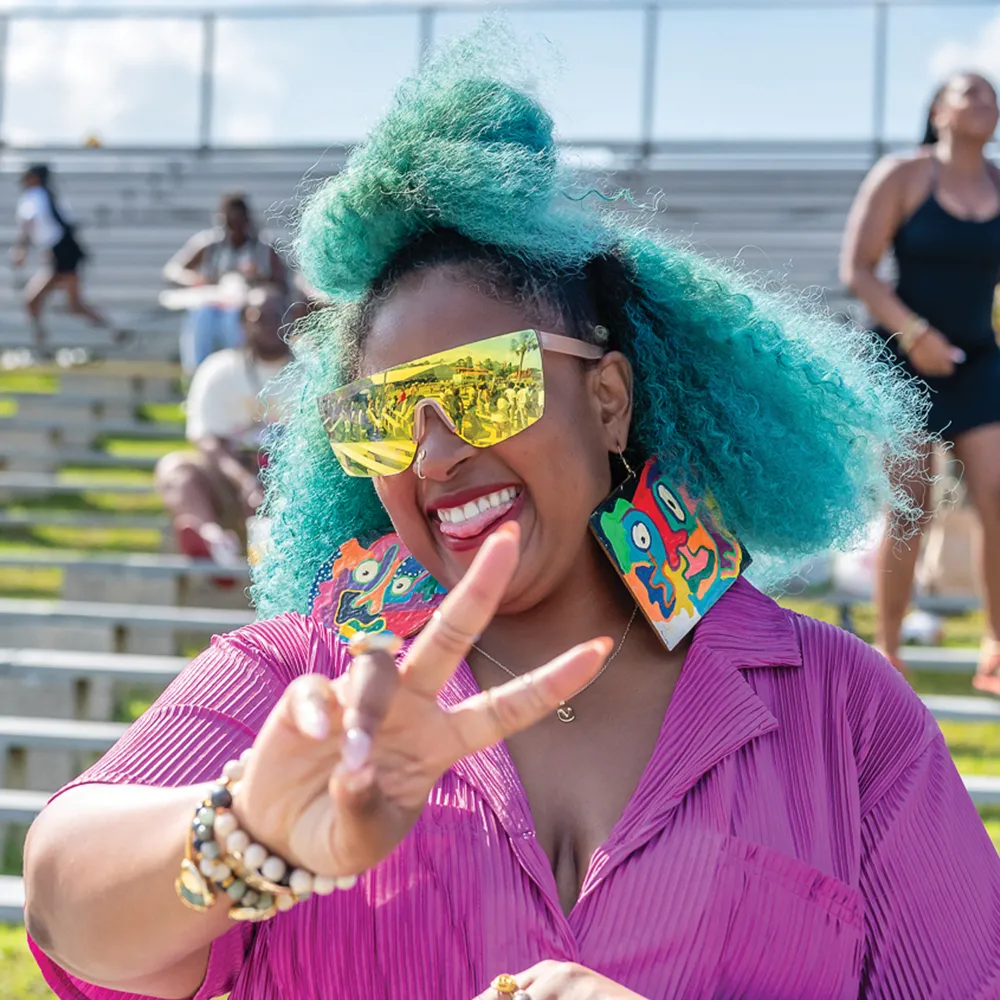
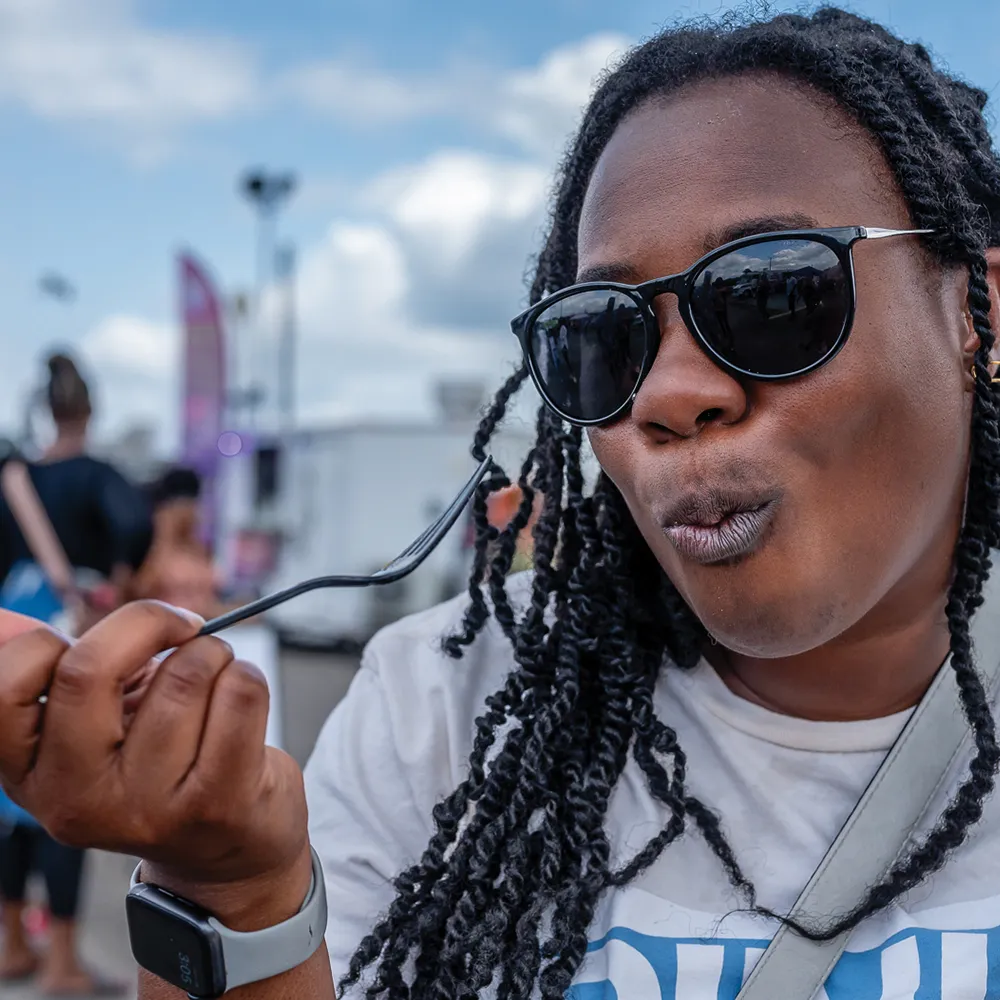
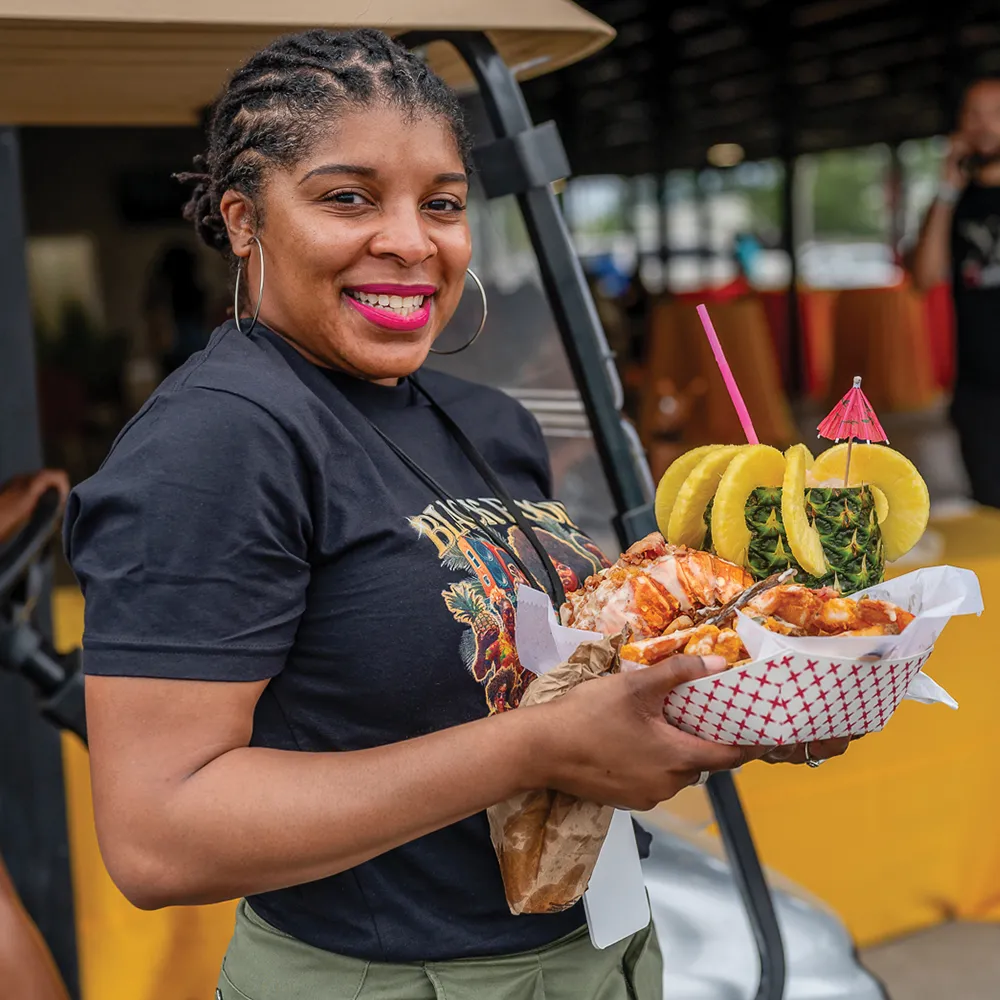
In 2022, the travel website Tripadvisor named the Black Food Truck Festival one of the top Black festivals in the country alongside Essence, Miami Carnival and Afro Punk.
His festival has also helped promote and grow Black-owned businesses. The average gross revenue for the roughly 50 food trucks is about $8,000 each, says Hammond, who just wishes his mother, who helped inspire the festival, were still around to see his success.
“One of the biggest things she would enjoy is seeing how the community is responding to something that essentially she created,” he says, adding that his dad is his biggest cheerleader and hasn’t missed a festival. “He goes around to taste all the food, enjoys the live music and, of course, critiques all of the food.”